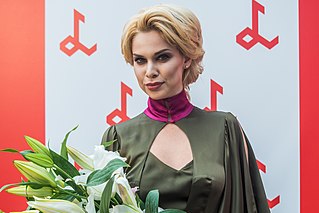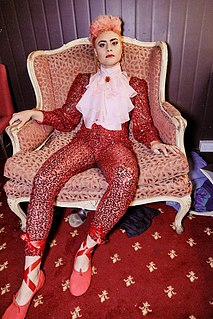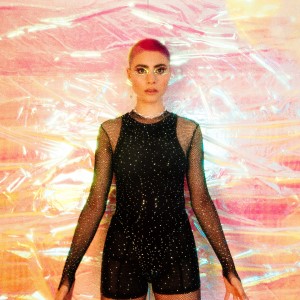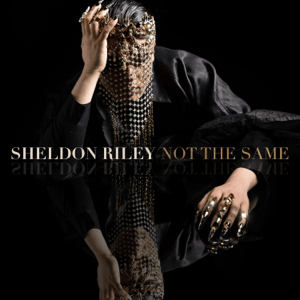
Seán Patrick Michael Sherrard, better known by his stage name Johnny Logan, is an Irish singer and composer. He is known as being the only performer to have won the Eurovision Song Contest twice, in 1980 and 1987. He also composed the winning song in 1992.

Eurovision: You Decide is the most recent name of a BBC television programme that was broadcast annually to select the United Kingdom's entry into the Eurovision Song Contest. The show had previously gone under several other names, including Festival of British Popular Songs (1957), Eurovision Song Contest British Final (1959–1960), The Great British Song Contest (1996–1999), Eurovision: Making Your Mind Up (2004–2007), Eurovision: Your Decision (2008), and Eurovision: Your Country Needs You (2009–2010), but was known, for most of its history, as A Song for Europe.

The Czech Republic has participated at the Eurovision Song Contest 10 times since making its debut in 2007. After receiving nul points in the semi-final of the 2009 contest and a lack of interest from the Czech public, Czech broadcaster Česká televize (ČT) decided not to participate in future contests. ČT announced their return to the contest in 2015, with an internal selection being used to select their fourth Eurovision entry.

Alexander Igorevich Rybak or Alyaxandr Iharavich Rybak is a Belarusian-Norwegian singer-composer, violinist, pianist and actor.

Samanta Poļakova, better known as Samanta Tīna, is a Latvian singer, songwriter and composer.

Australia has participated in the Eurovision Song Contest seven times since its debut in 2015 and has been in the top ten four times. It is the second country outside of the Eurasia region to take part in the contest since Morocco competed in 1980. The country's best result in the contest is a second-place finish for Dami Im in 2016. Australia also finished in the top ten in three of its other appearances in the contest, with Guy Sebastian finishing fifth in 2015, and both Isaiah and Kate Miller-Heidke finishing ninth in 2017 and 2019.
Armenia participated in the Eurovision Song Contest 2015 with the song "Face the Shadow" written by Armen Matirosyan and Inna Mkrtchyan. The song was performed by the group Genealogy, which was selected internally by the Armenian broadcaster Public Television of Armenia (AMPTV) to represent Armenia in the 2015 contest in Vienna, Austria. Among the members of the group included Inga Arshakyan who had previously represented Armenia in the Eurovision Song Contest in 2009. Genealogy and the song "Don't Deny" were announced as the Armenian entry on 11 February 2015, while the song, retitled as "Face the Shadow", was later presented to the public on 12 March 2015.

Jessica Alyssa Cerro, who performs as Montaigne, is an Australian art pop musician and Twitch streamer. Her debut album, Glorious Heights, was released on 5 August 2016 and peaked at No. 4 on the ARIA Albums Chart. At the ARIA Music Awards of 2016 she won Breakthrough Artist – Release for the album and was nominated for three other categories. In April 2016 she was a featured vocalist on Hilltop Hoods' track, "1955", which reached No. 2 on the ARIA Singles Chart. She was supposed to represent Australia in the Eurovision Song Contest 2020 with her song "Don't Break Me", until the contest was cancelled due to the COVID-19 pandemic. Instead, she represented Australia in the Eurovision Song Contest 2021 with the song "Technicolour", but did not qualify from the semi-final, becoming the first Australian entrant not to qualify to the final since the debut of Australia in 2015.

"1944" is a song written and performed by Ukrainian singer Jamala. It represented Ukraine in the Eurovision Song Contest 2016 and won with a total of 534 points.
Australia participated in the Eurovision Song Contest 2017 with the song "Don't Come Easy" written by Anthony Egizii, David Musumeci and Michael Angelo. The song was performed by Isaiah Firebrace, who was internally selected by the Australian broadcaster Special Broadcasting Service (SBS) to represent that nation at the 2017 contest in Kyiv, Ukraine. Firebrace as the Australian representative and the song he performed, "Don't Come Easy", was announced and presented to the public on 7 March 2017 during an announcement event in Melbourne.
Australia participated in the Eurovision Song Contest 2018 with the song "We Got Love" written by Anthony Egizii, David Musumeci and Jessica Mauboy. The song was performed by Jessica Mauboy, who was internally selected by the Australian broadcaster Special Broadcasting Service (SBS) to represent that nation at the 2018 contest in Lisbon, Portugal. Mauboy was announced as the Australian representative on 11 December 2017. The song Mauboy performed, "We Got Love", was presented to the public on 8 March 2018.
Australia participated in the Eurovision Song Contest 2019 with the song "Zero Gravity" written by Kate Miller-Heidke, Keir Nuttall and Julian Hamilton. The song was performed by Kate Miller-Heidke. The Australian broadcaster Special Broadcasting Service (SBS) organised the national final Eurovision - Australia Decides in order to select the Australian entry for the 2019 contest in Tel Aviv, Israel. Ten artists and songs competed in the national final and the winner was selected by a public and jury vote.
Australia originally planned to participate in the Eurovision Song Contest 2020 with the song "Don't Break Me" written by Jessica Cerro, Anthony Egizii and David Musumeci. The song would have been performed by Montaigne. The Australian broadcaster Special Broadcasting Service (SBS) organised the national final Eurovision – Australia Decides in order to select the Australian entry for the 2020 contest in Rotterdam, the Netherlands. Ten artists and songs competed in the national final and the winner was selected by a public and jury vote.
Australia participated in the Eurovision Song Contest 2021 with the song "Technicolour" written by Montaigne and Dave Hammer. The song was performed by Montaigne, who was internally selected by the Australian broadcaster Special Broadcasting Service (SBS) to represent that nation at the 2021 contest in Rotterdam, Netherlands. Montaigne was announced as the Australian representative on 2 April 2020 after she was due to compete in the 2020 contest with "Don't Break Me" before the 2020 event's cancellation. The song Montaigne performed, "Technicolour", was presented to the public on 4 March 2021.
Germany participated in the Eurovision Song Contest 2021 in Rotterdam, Netherlands, having selected Jendrik Sigwart as their representative with the song "I Don't Feel Hate", following a multi-stage internal selection.

"Technicolour" is a song by Australian singer-songwriter Montaigne. The song represented Australia in the Eurovision Song Contest 2021 in Rotterdam, the Netherlands, after being internally selected by the national broadcaster Special Broadcasting Service (SBS). Montaigne co-wrote the song with songwriter and producer Dave Hammer. Montaigne stated that the song "makes you want to cry, makes you want to dance, makes you want to take on a malignant corporate power". The song did not qualify for the final.

The Eurovision Song Contest has had a long-held fan base in the LGBT community, and Eurovision organisers have actively worked to include these fans in the contest since the 1990s.

Sheldon Riley Hernandez is an Australian singer. He represented Australia in the Eurovision Song Contest 2022 with his song "Not the Same". He first appeared as a contestant on the eighth season of The X Factor Australia. Riley later competed on the seventh season of The Voice Australia, and in 2020, he appeared on America’s Got Talent for its fifteenth season.
Australia participated in the Eurovision Song Contest 2022 in Turin, Italy. The Australian broadcaster Special Broadcasting Service (SBS) selected Sheldon Riley with "Not the Same" to represent the country, after he won Eurovision – Australia Decides on 26 February 2022.

"Not the Same" is a song by Australian singer Sheldon Riley, released as a single on 15 February 2022. It represented Australia at the Eurovision Song Contest 2022, held in Turin, Italy, in May 2022. The song was co-written by Riley with Cam Nacson and Timi Temple and produced by Nacson, and is about "discrimination and exclusion". The song details his experiences with autism.












